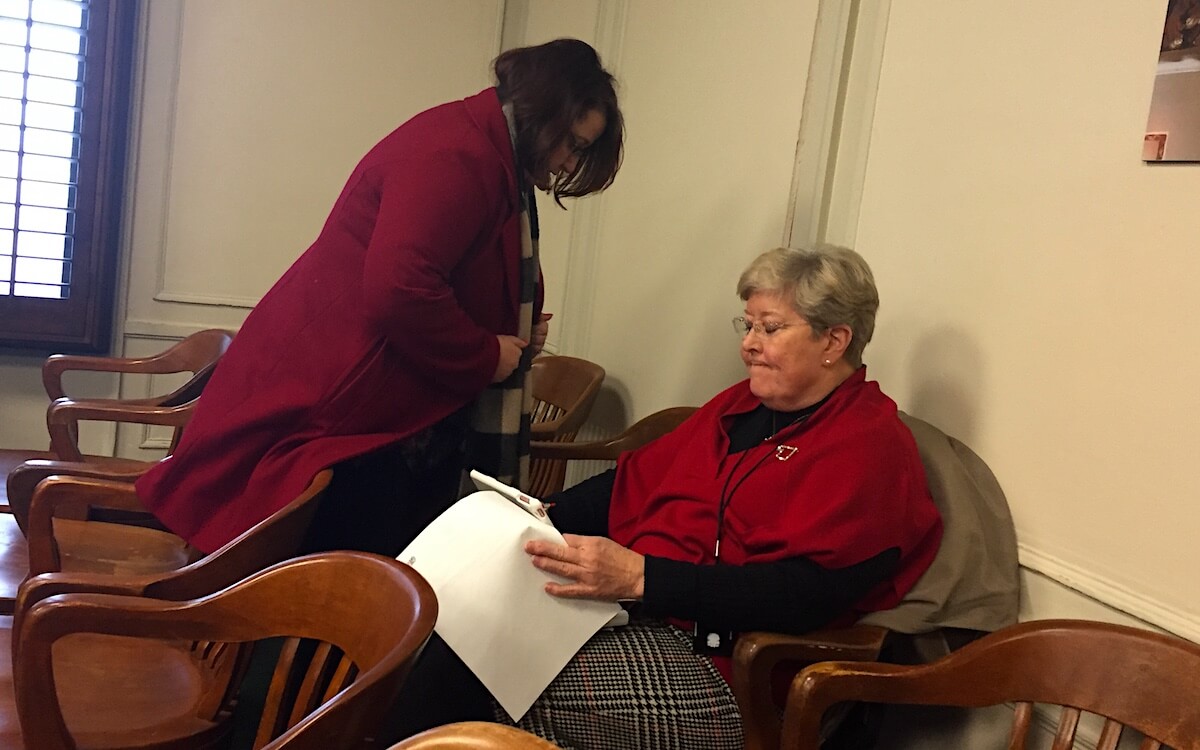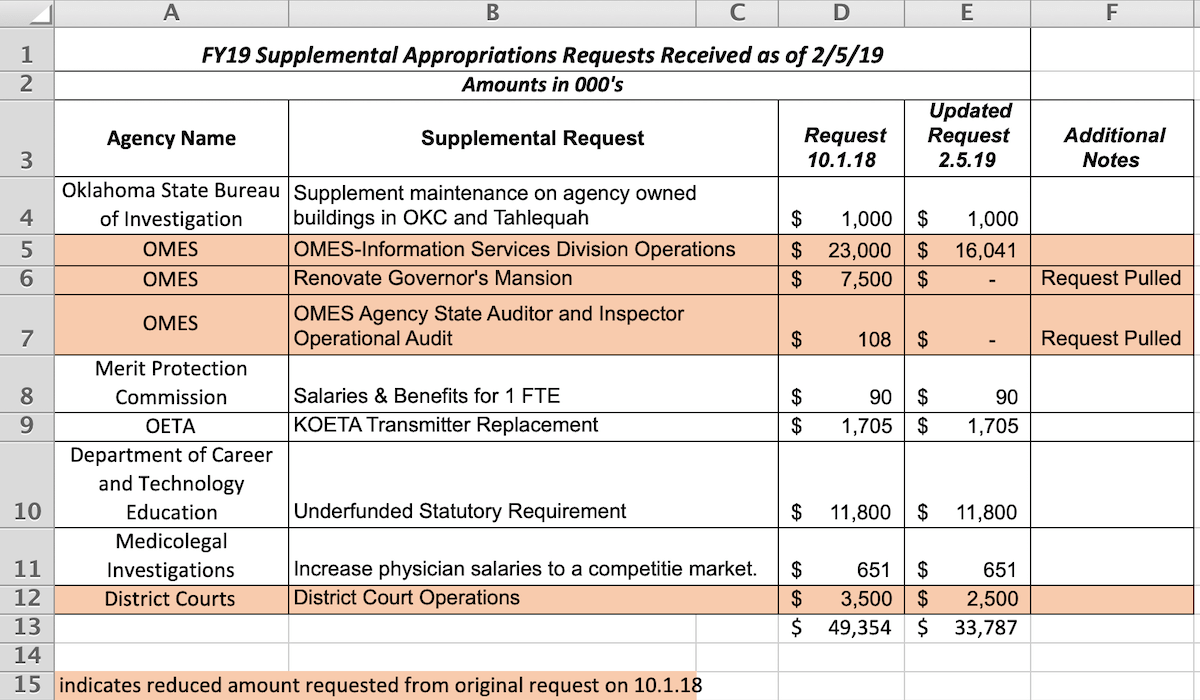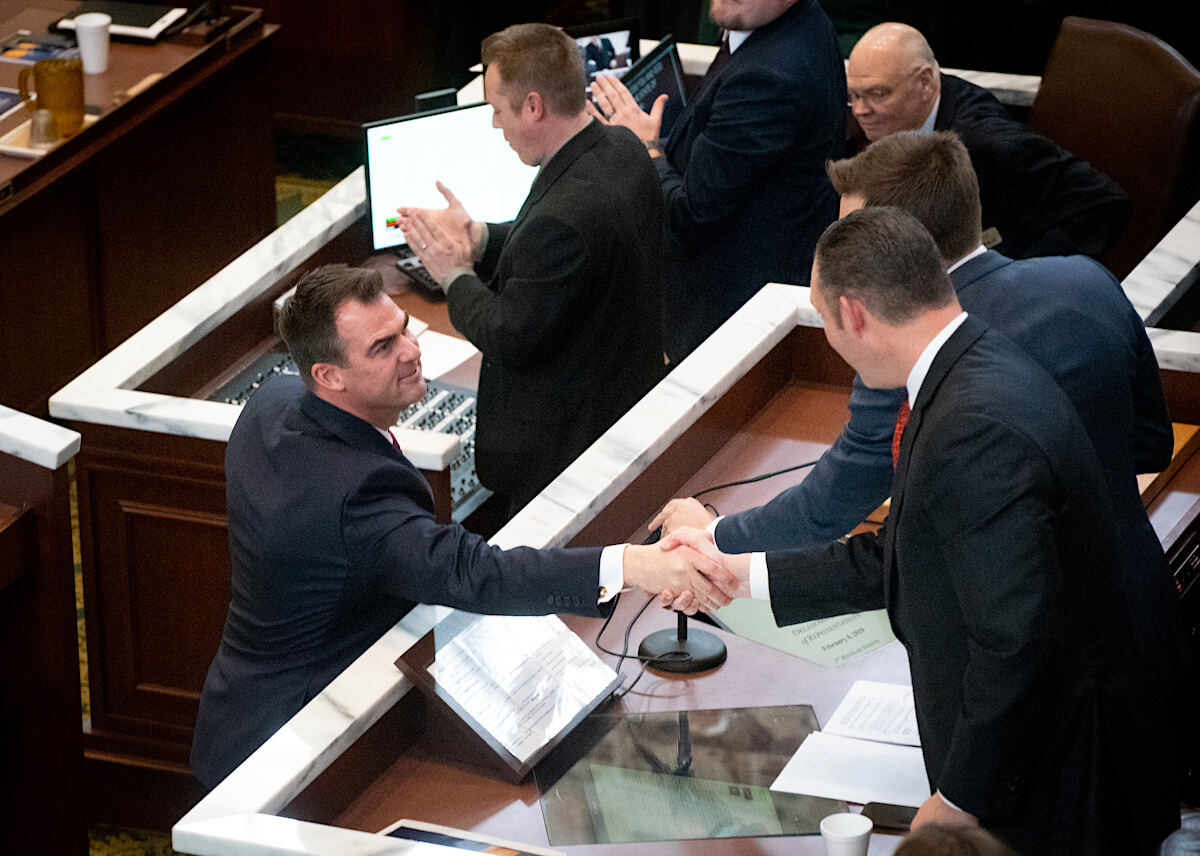(Update: This story was updated at 6:30 p.m. Wednesday, Feb. 20, to note that HB 2737 advanced unanimously out of House JCAB.)
Oklahoma’s district courts appear to be the most likely state agency to receive a supplemental appropriation for their Fiscal Year 2019 budgets, underscoring why some state leaders want to stop funding criminal justice agencies through court fees.
A committee substitute for HB 2737 would appropriate $2.5 million to the Supreme Court, and it advanced out of House Joint Committee on Appropriations and Budget on Wednesday afternoon.
Administrative Director of the Courts Jari Askins said the supplemental appropriation is needed owing to a 6 percent judicial pay increase that has taken effect earlier than the Board on Judicial Compensation intended.
She said Oklahoma collects between $55 million and $59 million in court fees for executive branch agencies annually, a volatile source of funding source that exacerbates the need for the supplemental appropriation.
“We have talked with the leaders of the Legislature about (whether) they could find almost $60 million to fully fund those programs within those executive-branch agencies and be able to begin to delete those fees and assessments off the books so that they would no longer be an obligation to criminal defendants,” Askins said.
While Gov. Kevin Stitt and legislative leaders have indicated a willingness to move away from fee-based budgeting for criminal justice agencies, the $2.5 million included in HB 2737 became necessary after a series of events surrounding judicial pay hikes.
In November 2017, that board recommended the July 1, 2019, implementation of the 6 percent raise that had been delayed since 2013. But in late June, Court of Criminal Appeals Judge Gary Lumpkin requested an informal opinion from Attorney General Mike Hunter about a state statute requiring any BJC raise recommendation “shall be effective on July 1 of the following year.”
Hunter responded July 12, 2018, that “this question is answered by the plain text of the statute,” meaning the raises must be implemented this fiscal year. The courts have requested $2.5 million in supplemental funding to cover the unanticipated cost.
“We did not know about that when we were writing the budget,” Senate Appropriations and Budget Chairman Roger Thompson said recently at the Capitol. “The appropriation chairmen were not notified of the raises.”
Thompson said the lack of communication frustrated him enough to file SB 71 this year, which would require the BJC to notify the governor and legislative leaders any time a recommendation for increased pay is put forward.
“Maybe we won’t get caught by surprise again,” Thompson said.
Court funding change could be ‘incremental process’

In the meantime, the judicial pay hikes mean the district court network’s existing $54.4 million appropriation likely will not be enough to cover payroll by the end of this fiscal year, said House Appropriations and Budget Chairman Kevin Wallace (R-Wellston).
“It depends on the fee collections that come in every month, and it’s not guaranteed what they are going to collect,” Wallace said Feb. 7. “We’re tracking that, and they may legitimately need a supplement based on raises going into effect earlier than they planned on putting them into effect.”
Askins said fee collections have not been enough to cover court budgets for the last several years. The judicial raises have exacerbated the problem.
“About 84 percent of district court funding is based on collections of costs in the court system, civil and criminal,” the former lieutenant governor said. “So as that money fluctuates, and with criminal justice reform I think it has gone down the last three years (…) we need to find a more stable revenue source.”
Wallace agreed the fee fluctuations are a problem.
“I agree it’s not the best model. I think that as a result of a number things — one being State Question 640 where it’s easier to pass a fee than raise a tax — then all of a sudden we’re tacking more and more fees on everything, especially on funding the courts,” he said. “It does take a certain amount of dollars for a court to operate.”
Wallace said he does believe lawmakers and the courts can “probably” find efficiencies and cost savings while changing the courts’ funding structure.
“I was told that in (Gov. Stitt’s) full budget, he was talking about contracting out court reporters, which currently they are an employee of the court,” Wallace said. “So some changes like that. But it’s going to probably be a phase-in, incremental process to ever get away from that fee base.”
Askins said she believes legislative leaders and Stitt’s office are discussing ways to fully fund “things like CLEET and the automated fingerprint identification system” and other justice system components, something Wallace echoed.
“I do believe we have created a cycle with a person who has a conviction that is pretty tough for them to ever get out of and break,” Wallace said. “There should be damages and punitive constraints or measures in place to make someone not want to commit crimes or have to pay fines, but once they get in that cycle it’s hard to get out. And it almost incentivizes prosecutions and convictions.”
Askins agreed.
“We ought to find a different way to fund it,” she said.
Wallace: ‘We had zero cash’

As shown above, six other agencies also requested supplemental funding during budget overview meetings with Stitt’s office.
“Just because somebody requests one doesn’t mean they are going to get a supplement,” Wallace said. “I don’t think it’s out of the ordinary for supplements (to be requested). I do think that people believe that, with a better economy, what better time to ask for a little additional supplemental whether they truly have to have it or not.”
RELATED
Stitt seeks more transparency for his own office funding by Tres Savage
Exactly how the Legislature could provide supplemental appropriations over the next four months could be tricky. Wallace said lawmakers could tap revolving funds for any supplemental appropriations, but he added that the previous year’s budget increase meant the Legislature does not have the cash on hand it normally would.
“Literally, by the time we finally passed the revenue package, we had zero cash,” Wallace said. “We’re kind of starting all over. Things will be much better if the economy will just stay flat just like we are right now with no major interruptions. By the time we come into session next year at this time, there should be a surplus of cash on hand if we don’t grow the budget from FY 19 to FY 20 drastically.”
One option to find cash for any supplemental appropriation could be the controversial $30 million sitting in an Oklahoma State Department of Health fund. The Legislature sent OSDH that amount as emergency funding in November 2017 special session after the agency appeared to be headed for financial collapse.
But a grand jury report concluded the $30 million was ultimately not needed, a determination some Capitol insiders disagree with. The agency was asked not to spend the money, holding it in a special fund instead. Stitt’s proposed executive budget for FY 2020 called for the $30 million to be used for agency audits and an increase in the state’s Quick Action Closing Fund for business recruitment.
“Everything is possible,” Wallace said of Stitt’s proposal. “I don’t know that the total balance will be put [in the Quick Action Closing Fund]. I think we are going to have to make some supplements because, like I said before, the courts — and they’ve been working with us all interim long — knew that once that ruling came out that the raises are supposed to go into effect, and they went ahead and held out another six months, they knew that their budget wouldn’t cover the payroll.”
HB 2737 would appropriate the courts $2.5 million from the General Revenue Fund.
OMES makes IT request
The largest supplemental appropriation request made to Stitt’s team came from the Office of Management and Enterprise Services: $16 million for its Information Services Division.
OMES director of public affairs Shelley Zumwalt provided NonDoc with a three-pronged explanation for the agency’s request:
OMES is requesting a $16M supplemental to fulfill three distinct and immediate needs. First, a portion of those supplemental dollars will go to replace funding from the Joint Computer Enhancement Fund with appropriated dollars. Due to legislation passed in previous sessions, revenue to that fund has been significantly reduced. Without money dedicated to ensuring OMES has the ability to make needed security patches and maintain state computers on a regular cycle, we will put state data at risk.
Second, increased utilization of IT devices and services is also a main driver of cost to the agency. Utilization of mobile devices has increased exponentially and keeping up with agency demand has strained OMES’s finances. Without proper funding to continue to provide devices and service at the rate state agencies demand, the availability of those resources to state agencies will suffer.
And third, this supplemental will go toward increasing cyber security protection. State data is quite possibly Oklahoma’s most valuable resource, after its people. Without proper funding for resources and staff in this area, cyber security data breaches could become more frequent. Threats from cyber criminals will only increase in the future and keeping this nationally recognized program functioning optimally should be one of the state’s highest priorities.
Career Tech seeks health benefit funding
The other major request for supplemental appropriation for this fiscal year has come from the Oklahoma Department of Career and Technology Education: $11.8 million for employee health benefit allowances within the state’s Career Tech system.
Paula Bowles, ODCTE chief communications and marketing officer, said her agency is required to send state funding to technology centers to fund those benefits, which the individual centers must cover if state appropriations fall short.
“It takes away from the money they would spend in the classroom,” Bowles said. “So they have to take money from other sources that would actually fund innovation and professional development — other things that would actually benefit the students.”
Wallace said he had heard the Department of Career Tech wanted a supplemental appropriation but that “we’ll have to look in-depth” at the agency’s request.























